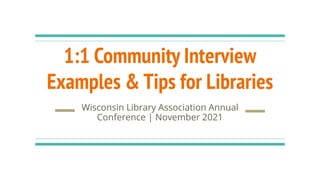
1:1 Community Interview Examples & Tips for Libraries
- 1. 1:1 Community Interview Examples & Tips for Libraries Wisconsin Library Association Annual Conference | November 2021
- 2. Welcome & Introductions Martin Alvarado, Madison Public Library Jon Mark Bolthouse, Fond du Lac Public Library Laura Damon-Moore, WiLS
- 3. Overview | 1:1 interviews for libraries Why ● Allow you to ask follow-up questions, understand the “why” ● Inclusivity and accessibility ● Connecting 1:1, relationship building ● Pearl-growing your network ● Co-creation with your community When ● Ahead of, or as part of, major decision-making or planning processes ● As a way to do ongoing information gathering related to strategic priorities ● When planning for or working on community history or documentation efforts
- 4. Case Studies | 1:1 Interviews
- 5. Case Study #1 | Fond du Lac Public Library ● 2021 Strategic Plan ○ Community Survey ○ Community Leader Questionnaire ○ Staff SOAR Conversation ○ Board Discussion ○ 1:1 interviews
- 8. Case Study #1 | Fond du Lac Public Library ● Find the “Connectors” ● Pick from contact list ● Invite for 1:1 interviews
- 9. Case Study #2 | City of Madison City staff from different professional backgrounds engaged residents on parking and transportation issues with the aim of prototyping an intervention. Human-centered design (qualitative research approach) Learn about the problem Come up with ideas and prototype Implement Brief intercept/contextual interviews: ● Connect with the person close the experience, rather than relying on recall ● Allow observation of behavior and comparison with answers ● Good for: testing assumptions, preparing for long-form interviews, presenting prototype ideas ● Informal and semi-structured Resources https://www.digital.govt.nz/standards-and-guidance/design-and-ux/service-design/service-design-tools/intercept-interviews/ https://www.nngroup.com/articles/contextual-inquiry/
- 10. Case Study #2 | City of Madison Resources De Leon, J. P., & Cohen, J. H. (2005). Object and walking probes in ethnographic interviewing. Field Methods, 17(2), 200-204. Long form interviews ● Find places where communities of interest gather or access services ● Multiple ways of posing a question: interview questions, visual prompts, flash cards to evoke responses ● Take notes vs make a recording (allows more conversational feel while capturing all information) ● Take verbatim quotes (a more direct link to the speaker’s thoughts and feeling) vs paraphrasing ● Interviewee as expert
- 11. Case Study #2 | City of Madison Before and after the interviews ● Find a good framework to direct research, organize information and refine it ● Consider working with a partner or a team ● Consider developing personas (composite representations of your interviewees) Resources http://designthinkingforlibraries.com/ https://civicservicedesign.com/tools-tactics/home https://www.usability.gov/how-to-and-tools/methods/personas.html
- 12. Case Study #3 | Madison Public Library ● Living History Project → Stories from a Distance ● Community stories related to the COVID-19 pandemic ● Focus on underrepresented voices and stories ● Big pivot to distanced interviews ● Pearl-growing → “Who else should we talk to?”
- 13. Best Practices & Considerations
- 14. Best Practices & Considerations Format / platform: ● Technology can be a barrier ● Offer several choices of interaction ● Location ● Compensation ● Flexibility in how much time you ask for
- 15. Best Practices & Considerations Crafting questions: ● What do you want to learn? ● How do you expect to use the information that you are gathering? ● Core questions and follow-ups ● Warm-up questions ● Open-ended questions ● Magic wand question Roulston, K. (2010). Asking questions and individual interviews. Reflective interviewing: A guide to theory and practice, 9-33. (PDF)
- 16. Best Practices & Considerations Data, information and ethics ● Data/information use policy ○ What do we want to know? ○ How do we want to be able to use it? ■ internal ■ external ○ Safeguards ○ Don’t over-collect ○ Anonymizing, confidentiality, and public use of information. ● Informed consent: Develop a consent form/release for use of information ○ Explains any compensation that will/will not occur ○ Explains the purpose and scope of study ○ Explains exactly how name, image, words, and data will be used ○ Explains that the participant can quit at any time ○ Written in plain language (8th grade level) ● Demographics - purposes ○ Who took part in the study? (retrospective) ○ Are we achieving representation of categories we wanted to include? (prospective) ● Demographics - best practices ○ Provide inclusive categories and also allow individuals to self-identify ○ Ask for ranges rather than exact figures (age, income, level of education) ○ Why do I need/not need to know a given category (race, gender, sexual orientation)? ○ Multi-lingual surveys? Informed consent creates an ethical boundary around the process Resources Evaluation Guide for Public Libraries by Kate Haley Goldman
- 17. Best Practices & Considerations Following up / next steps ● Write a thank-you note ● Be specific about what comes next (relates to informed consent) ○ What will be done with notes or transcripts ○ Point people to language or information so that they are aware and can return to it if questions arise ● Ask if and how they would like to stay connected to the project
- 18. Q&A
